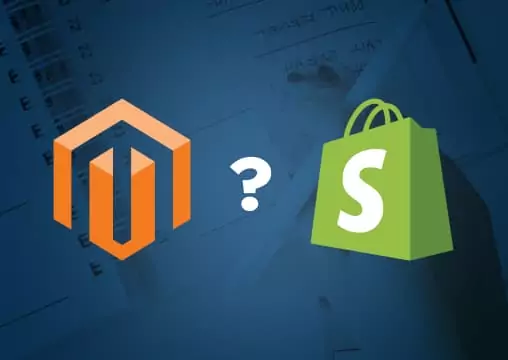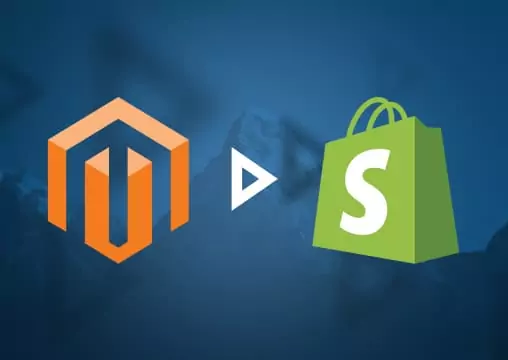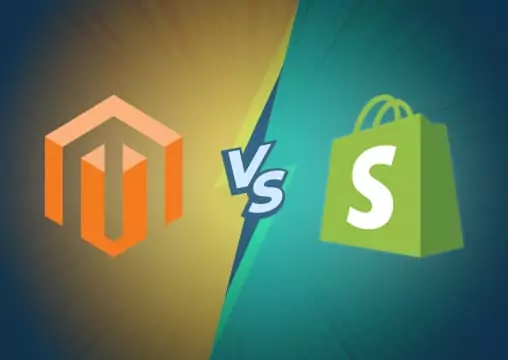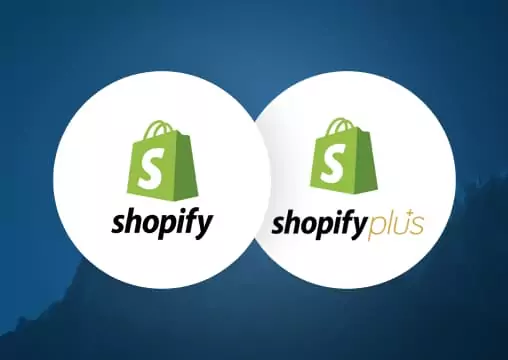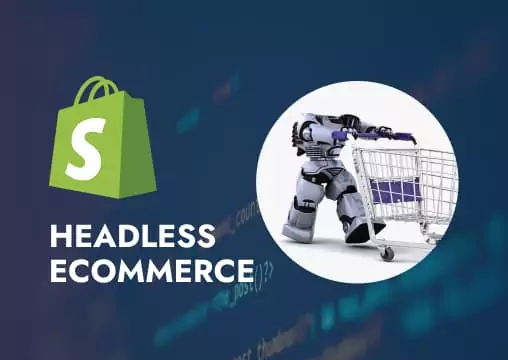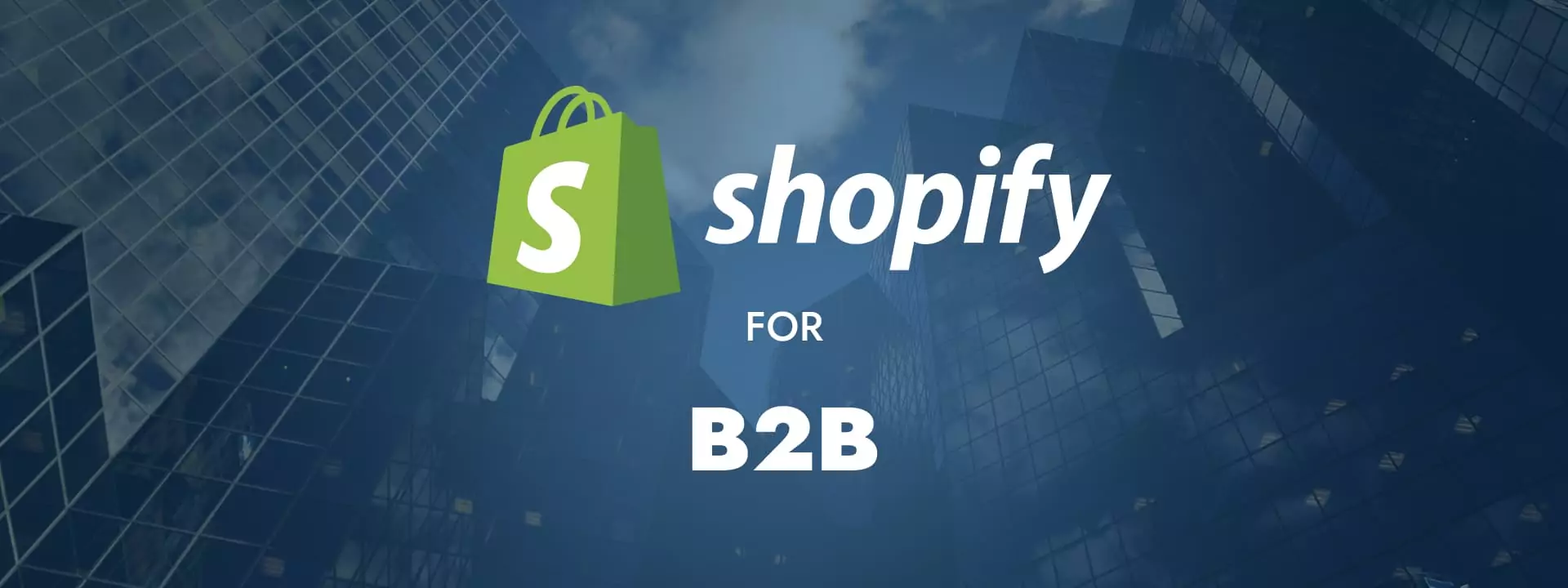
Shopify for B2B Companies: Features, Benefits, and How To Optimize Your Online Store
f you’re in the B2B sector, hearing claims about the benefits of Shopify for B2B companies is inevitable.
For many, the solution remains the be-all and end-all to host their products. But others are still contemplating if the solution meets their needs and if it might be a good fit for their organization.
If you’re one of those wondering what Shopify Plus can offer you — its features, benefits, and use cases — and how it differentiates itself from other solutions in the market, then this article is for you!
Let’s begin by uncovering the benefits of Shopify for B2B companies to help decide if it’s the exact solution your organization needs.
Why are companies building B2B Shopify stores?
B2B Shopify is the term used for all the B2B features and offerings that Shopify Plus hosts. At the present moment, the capabilities of B2B Shopify extend to all types of businesses, such as wholesalers, resellers, large online stores, enterprises, manufacturers, nonprofits, and other organizations.
Since B2B is a booming industry, with projections that more than 80% of all sales taking place by 2025 will be digital, now is the perfect time to harness the power of an e-commerce platform to host your products and services.
Here are just a few of the reasons why you should choose Shopify as your preferred B2B ecommerce platform:
- No coding: There are two things about coding that everyone knows: (i) it’s not an easy job, and (ii) you cannot do it quickly. Combine these two things together, and it’s no wonder why most people stick with Shopify since it’s a no-code platform. You can simply sign up today and get started.
- Easy and intuitive: Shopify hosts more than 4.4 million websites globally and sees millions of transactions and visitors daily. It’s also been in the industry for more than 17 years, so it has plenty of knowledge about the ins and outs of the ecommerce world. The company is committed to making its platform extremely easy to use for all Shopify B2B and B2C users.
- Third-party integrations: To ensure that all solutions in your tech stack work well with each other, Shopify allows users to integrate the platform with third-party solutions, such as Klavyio, Facebook, Freshmarketer, Reconvert, Stock Sync, Seal Subscriptions, third-party payment providers, and more.
- Unlimited customizations: B2B Shopify is one of the most customizable ecommerce platforms a customer can have the advantage of using. Not only can you personalize the entire look and feel of your store, but you can also tailor-make other elements, such as products, coupon codes, customer experiences, checkouts, functions, payments, and more.
These advantages help business owners provide better experiences for their customers. To understand what Shopify can do specifically for your B2B business, let’s dive in and take a look at all the features that come with building a B2B Shopify storefront.
B2B Shopify Features
We know we’ve set Shopify Plus for B2B businesses at a pretty high bar, but you’ll know why we’ve praised it so much after seeing the features the company offers. So, let’s take a look at them!
1. Company Profiles
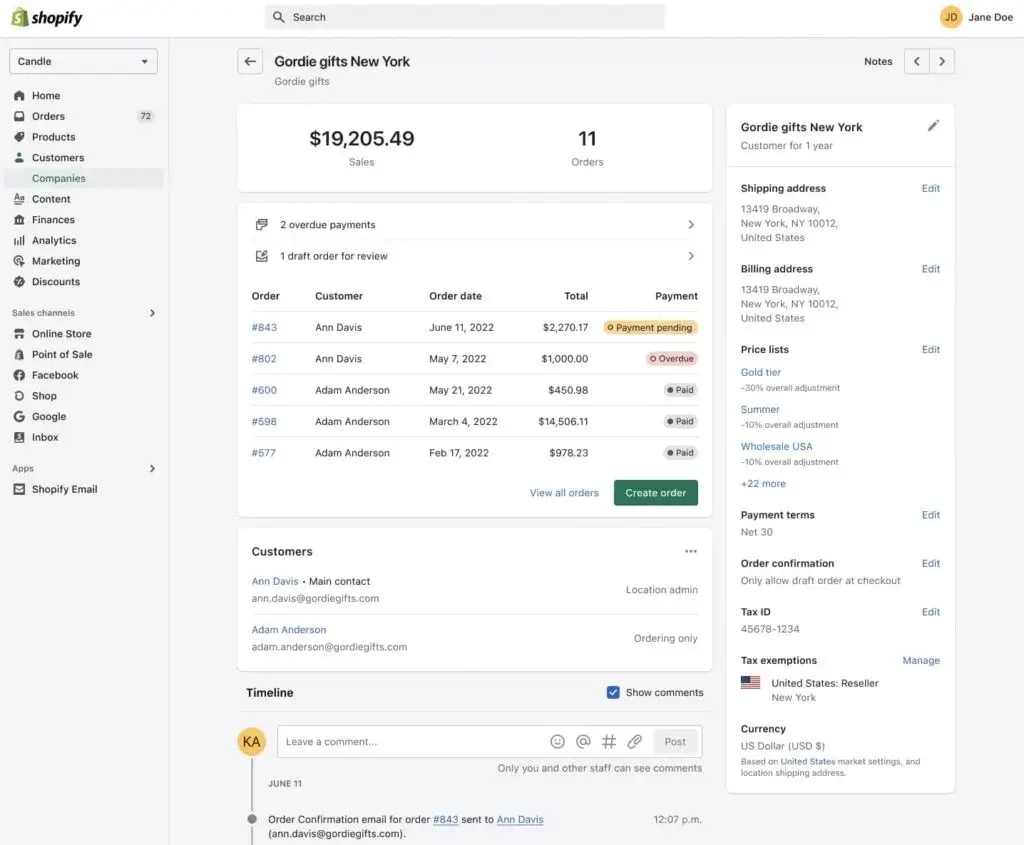
When operating a B2B business, you’ll likely have a roster of a few regular clients, such as wholesalers, distributors, or enterprises. In such cases, where a long-lasting relationship is apparent (and preferred), Shopify allows you to set:
- Payment terms
- Tax ID
- Customer names and contact permissions
- Price lists
- Tax exemptions (if any)
- Shipping and billing addresses
- Currency preference
- Summaries and timelines of orders placed
It also allows you to access an overview of the history of the account. For example, if you wish to find out which order was placed on what date or if you want to know how many invoices have been paid vs. how many are pending for a particular client, all that information is directly available on your dashboard.
Having such data at hand helps you manage long-lasting decisions better and automates repetitive tasks.
2. Price Lists
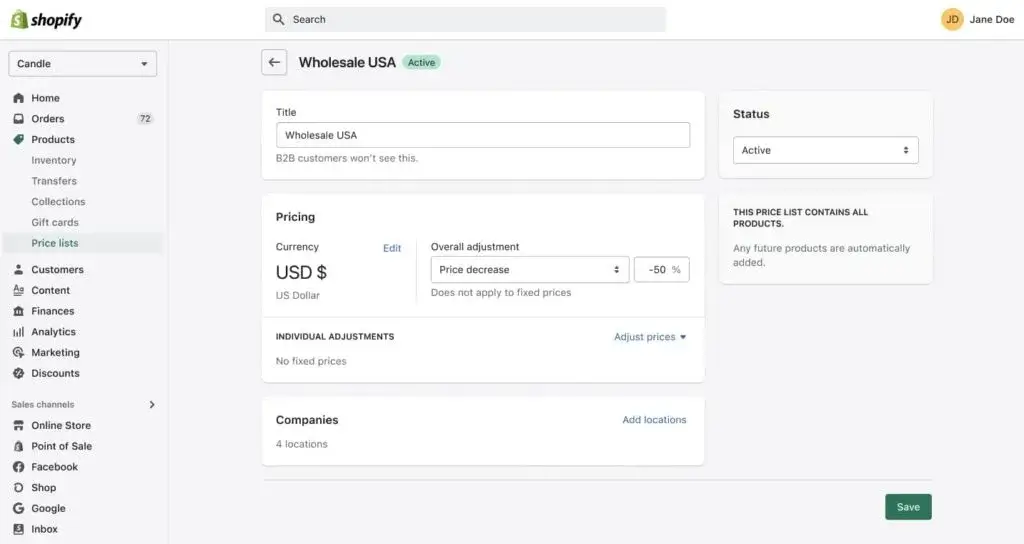
Pricing is a huge part of operating any business. This is why the B2B platform Shopify hosts offers a handy-dandy feature called “price lists,” which allows you to add custom pricing to your products.
This feature has three major benefits:
Benefit #1
It allows you to custom-add prices and discounts to individual products based on the customer type. For example, you might want to set different prices for a high-volume B2B client vs what you charge a business that buys small amounts of what you sell — if so, you can easily customize prices with Shopify’s price list feature.
Benefit #2
It also allows you to set multiple currencies in one store. For example, customers from India will see prices in rupees, whereas customers from the United States will see prices in dollars. You can also change pricing based on the location (important, as the price to produce and/or distribute a product in one location may be more expensive than another location).
Benefit #3
Lastly, you can create unlimited price lists with Shopify Plus for B2B companies, and you won’t need to rely on third-party apps or integrations to make it happen.
3. Payment Terms
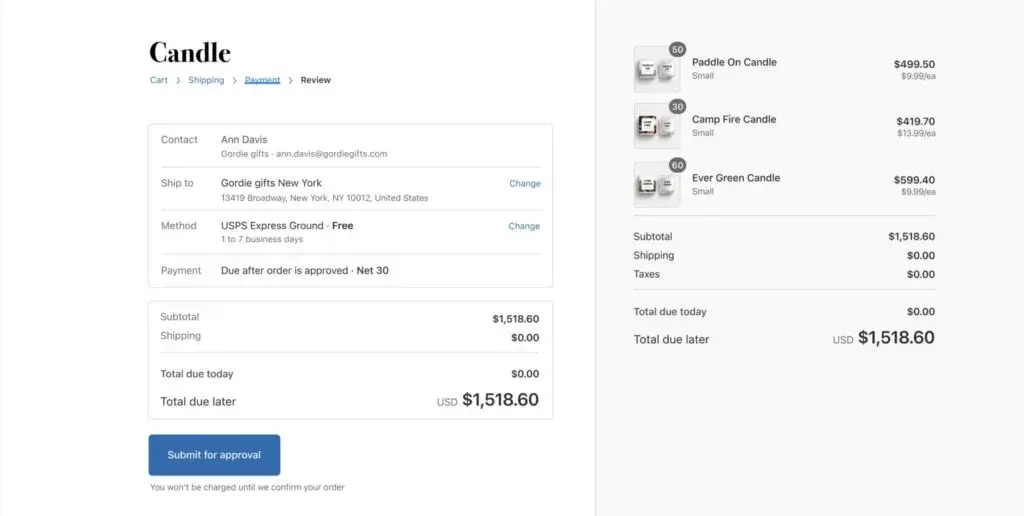
If you’re a B2B merchant, you probably have different payment terms with different buyers — e.g., some pay in a week, some pay within 15 days, others pay once a month, etc.
Shopify understands this, which is why it lets you set payment terms, such as net-7, net-15, net-30, net-60, and net-90. This allows you to track and collect payments as soon as they are due.
On the flip side, if you don’t wish to adhere to any of these payment terms, you can just set up the payment term as “none.”
Alongside payment terms, you can also set up the preferred payment method (e.g., credit card, bank transfer, or online payment systems).
4. Checkout and Self-Serve
Imagine using an Amazon Prime account for online shopping (or, if already in use, no need to imagine). Ideally, any time you login to that account, you will be able to see all information on your past orders, wish lists, account balance, billing address, and more.
Shopify’s checkout and self-serve feature is something like that, except that it’s more extensive.
That’s to say, your Shopify B2B customers get their own accounts where they can review all their order information, track orders by status, tags, order numbers, or dates, or select specific company locations and edit their information, see wholesale prices, place orders based on the location, and do lots of other tasks.
When checking out, they can also view payment terms, methods, discounts applicable to them, etc.
You can share account details with your B2B customers through a welcome email or by directly sending it to them.
5. VAT validation for EU businesses
Another excellent benefit that brands get with Shopify Plus for B2B business is VAT validation for EU businesses.
Different countries have different regulations when it comes to taxes, and as far as the EU is concerned, certain products (depending on the location or who you sell to) may be tax-exempt, which is an excellent advantage businesses can leverage.
In such cases, you’ll need to provide Shopify with an exemption letter and your Tax ID. You can directly add these details to the checkout page of your B2B storefront on Shopify. However, you might need to download a VAT validation API to complete the payment process.
6. Managing B2B Customers
Customer management is an essential part of operating any business, B2B or otherwise. However, because B2B businesses usually deal with larger orders (and hence higher profit margins), ineffective customer management can cost you considerably.
So, Shopify provides the following features to help you manage customer relationships:
- Controlling customer permissions (you can control who gets to see what information)
- Adding or deleting customers (you can remove or add customers from the store)
- Setting up location-specific customer accounts (you can add up to 10 customer accounts from the same location)
- Adding an extra layer of security (B2B buyers are authenticated, so you only show the right people sensitive company information)
7. Enterprise Resource Planning (ERP) software integration
To streamline business operations, many companies use enterprise resource planning (ERP) software that helps them navigate orders, inventory, product information, and more.
Because of this, one of the biggest questions companies have is: how well will Shopify adapt to my existing tech stack?
Well, potential users of Shopify will be happy to know that the solution can easily integrate popular third-party ERPs, such as Microsoft and Oracle, through its Global ERP Program.
According to Shopify’s press release, “Through the Global ERP Program, merchants can now access a suite of certified apps directly integrated with Shopify, without needing to rely on third-party implementations to connect their ERP to Shopify.”
With this new addition, Shopify-based B2B businesses are able to save time, money, and energy by being able to track, review, and control all their data to get actionable insights and create a seamless workflow.
What is the Plus Wholesale Channel (PWC) on Shopify?
The Plus Wholesale Channel (PWC) on Shopify, also known as the Shopify Wholesale Channel, is a separate platform that’s not connected with the core functionality of Shopify. That being said, the Shopify Wholesale Channel still operates within Shopify.
The reason why people use this platform is because it allows users to set up a wholesale store for the same products they sell in the retail store, but set different prices for the same products (however, this is now possible with Shopify for B2B, too).
This Shopify Wholesale Channel works best for those users who primarily operate in the B2C market, but also cater to B2B orders (if the opportunity allows) and hence are looking to set different prices on the same product range for B2B and B2C customers (again, Shopify for B2B has this feature, too).
This PWC store, however, is not visible on search engines like Google, Bing, DuckDuckGo, etc., as it’s not indexed. You can share the URL of these sites for those customers who express interest in buying in bulk.
The Differences Between B2B on Shopify and The Plus Wholesale Channel
Your B2B Shopify store will be built on the Shopify platform.
On the flip side, as we mentioned above, the Plus Wholesale Channel is not connected to the product’s core functionality and has a siloed structure. Hence, it does not have all the customizations that Shopify offers.
For example, users of the PWC store cannot customize functions, discounts, and themes, or get access to third-party integrations or APIs.
Another way the two channels are inherently different is because Shopify for B2B allows users to build two different types of sites:
- A single site that hosts products for both B2B and B2C storefronts. This site allows you to have data on all your business operations in one place.
- An expansion site that hosts only your B2B products and is separate from your B2C operations but is still connected with Shopify’s core functionality.
Conversely, the PWC store only allows users to host B2B products and is not connected with Shopify’s core functionality. That’s to say, aside from not being able to use Shopify’s customizations and third-party connections, you also cannot use Shopify’s ERP, API, and CRM integrations if you use the PWC store.
Which solution offers greater customization for the buyer experience?
To ensure that both B2C and B2B merchants see all benefits of using Shopify, the Shopify B2B store was created to give all types of users access to the same number of customizations, features, benefits, and more.
While many users still prefer to use the PWC store, the future of Shopify for B2B customers is Shopify B2B (yes, this statement has been confirmed by the company itself).
This is because you can access all of Shopify’s out-of-the-box features, functionalities, and customizations with Shopify B2B. Not only can you customize themes, storefronts, functions, discounts, and a whole lot of other things, but you can also integrate the B2B platforms with CRMs, ERPs, APIs, and other third-party sites.
In comparison, while adequate for some businesses, keep in mind that the Shopify Wholesale Channel only allows one option for the storefront theme.
In the future, Shopify also plans to add other features to Shopify B2B, such as:
- Being able to add purchase order numbers
- Trying out quantity purchasing rules
- Being able to show or hide products from certain customers
- Providing quantity price breaks
Wrapping upWrapping up
It goes without saying that Shopify for B2B is the future of the B2B ecommerce world, and setting up online storefronts at the earliest opportunity possible is a great way to stay cutting-edge.
If you wish to develop a B2B Shopify store that’ll put you ahead of your competitors and give you all the customizations you need, get in touch with MTN Haus, and we will make it happen!
